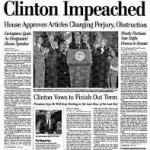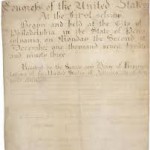Over 100 cases are in federal court challenging constitutional aspects of the Affordable Care Act. Most cases address a specific portion of the act and may alter a portion, but not overturn the entire law. Three cases have potential to doom the entire law. These cases involve the Constitution’s Origination Clause which requires that “…bills […]
Constitutional Impeachment: An Alternative to Assassination
The Constitution‘s Impeachment Clause regarding the president and all civil officers of the United States is in Article II and reads: “The President, Vice President and all civil officers of the United States, shall be removed from office on impeachment for, and conviction of, treason, bribery, or other high crimes and misdemeanors.” The Constitution’s Article […]
11th Amendment Overrules the Supreme Court
The Supreme Court interprets the Constitution. If the Court makes an unpopular decision, the recourse is an amendment. This happened with the Eleventh Amendment. During the Revolutionary War a South Carolina merchant, Captain Robert Farquhar sold supplies to the State of Georgia on credit. Following the War, Georgia refused to pay Farquhar asserting that he […]
Book Review: The Second Revolution and The 2nd Amendment
“The laws that forbid the carrying of arms … disarm only those who are neither inclined nor determined to commit crimes…. Such laws make things worse for the assaulted and better for the assailants; they serve rather to encourage than to prevent homicides, for an unarmed man may be attacked with greater confidence than an […]
Constitution’s Origination Clause: Why Revenue Bills Start in the House, Part 3
Part 1 examined the history and purpose of the US Constitution‘s Origination Clause. Part 2 introduced the Senate practice of “gut and replace” that pretends to comply with the Origination Clause. This article explains why “gut and replace” violates the Constitution.[1] The Origination Clause provides that laws for raising revenue[2] must have started in the […]
Constitution’s “Origination Clause”: Why Revenue Bills Start in the House, Part 2
For Drafters of the Constitution, a vexing problem was to establish a government that would give life to the philosophies of the Declaration of Independence and meet the practical political considerations of merging diverse states of differing size and traditions into a nation. Among the solutions was the Constitution’s Origination Clause in Article I, Section […]
Constitution’s “Origination Clause”: Why Revenue Bills Start in the House, Part 1
This is Part 1 of a three part series discussing the Constitution’s Origination Clause. Part 2 explains the Senate procedure of “gut and replace”. Part 3 explains why “gut and replace” violates the Constitution. There are overriding principles embodied in the US Constitution, derived from the Declaration of Independence. These principles are beliefs about the […]
Two NSA decisions: One for the Constitution, One for the Government
On December 27, Federal Judge William Pauley, of the Southern District of New York, admitted everything that, on December 16th, Judge Richard Leon indicated was wrong with the National Security Agency’s Data Collection and Surveillance[1] program and, unlike Judge Leon, decided the program was reasonable, lawful and constitutional. Pauley Admits the Dangers to Liberty, but Trusts the Government […]
Courageous NSA Ruling by Judge Leon Respects Privacy and Fourth Amendment
On December 16, 2013 US District Court Judge Richard Leon took on arguments[1] that over the years have been used to expand government intrusion into American life in ways that would have left James Madison “aghast”.[2] His opinion in Klayman v. Obama finds much of the National Security Agency’s (NSA) surveillance collection of “telephony metadata” […]















What a President Can Legally Do With a Pen and a Phone, Part I
President Obama brought national attention to the idea of running the country by “executive order” with his now famous: “I’ve got a pen and I’ve got a phone”. He made that intent clear during the 2013 and 2014 State of the Union Addresses as well: “… if Congress won’t act soon … I will… I will […]